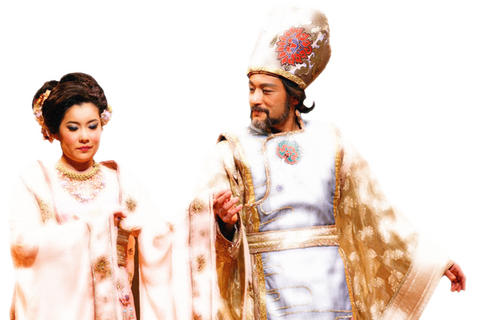Firmiana Rain, which opened at the National Theater, Taipei, on Thursday, was a highly ambitions work of artistic fusion that anyone who knew what they were in for would have attended with trepidation. Despite this, the appeal of Chen May-tchi's (陳玫琪) critically acclaimed composition, which brings ancient Chinese and Japanese court music into the structures of contemporary Western classical music, managed to pack the house. The music was fascinating to listen to, but one was inclined to wish away the distractions of what was happening on stage, which served as a kind of tableaux vivant to illustrate aspects of the music. It did so, unfortunately, to no great effect.
The two lead singers, soprano Kimiko Hata and baritone Kouichi Taira, tackled their parts manfully, but there was no chemistry on stage, and the romance never really got off the ground. This was not helped by some rather bathetic moments, when the effort of achieving high romantic flourishes fell flat. When the heroine discovers her lover in bed with another, the intended effect cannot have been uncontrolled giggling from what was generally a very sympathetic audience trying to come to terms with something new.
Beijing opera singer Liu Fu-hsueh (劉復學) and gezai opera star Tang Mei-yun (唐美雲) were shamefully misused, the former having no opportunity to show off his talents. Tang's performance as the poet Li Bai was a straw at which a grateful audience grasped at as something familiar and comprehensible, and her two cameo appearances garnered more applause than almost any other part of the show.

PHOTO: COURTESY OF NTCH
Hata sang with conviction, but the other members of the cast often showed a lack of commitment, with moments that suggested that they felt ridiculous and ill-used. All of this detracted from a brave effort, undermined by an attempt to cram too much into a single performance.
The Second Goodbye, which opened on the same day in the National Experimental Theater, also set out to fuse many diverse elements, and it came out triumphant. The show, a chamber ensemble compared to Firmiana Rain's orchestral work, was also vastly ambitious in its own terms, with its score for Chinese instruments written by Dutch composer Marlijin Helder, and the combination of the body puppets of Ulrike Quade, Taiwanese glove puppets and the motley repertoire of experimental theater. Quade's performance was outstanding, the complex relationships between actors, puppets and puppeteers well thought out, and a video projection and paddling pool, which stood in for the River Styx, served the story rather than distracted from it.
If one were to find fault, it would have been in the balance of music and voice, when, on a small number of occasions, the accompaniment would drown out the words. This was not a serious flaw, as the dramatic burden is carried by the physical theater and the music. Seen on its second night, the show already had a smooth and well-oiled feel.
Fusions of different traditions will inevitably show the stresses and strains of forcing together diverse elements. Unfortunately for Firmiana Rain, the strains proved too much, and the problems of staging the composition undermined the audience's ability to come to grips with the complexities of the music. Musically much simpler, The Second Goodbye emphasized stage performance, and in the context of experimental theater, where boundaries are much more fluid, created a much more harmonious mix. The Second Goodbye will be performed at the Beijing International Contemporary Theater Festival (北京國際當代戲劇演出季, Nov. 7 to Nov. 10) and the Contemporary Theater Festival in Shanghai (亞洲當代戲劇季, Nov. 13 to No. 14).

Not long into Mistress Dispeller, a quietly jaw-dropping new documentary from director Elizabeth Lo, the film’s eponymous character lays out her thesis for ridding marriages of troublesome extra lovers. “When someone becomes a mistress,” she says, “it’s because they feel they don’t deserve complete love. She’s the one who needs our help the most.” Wang Zhenxi, a mistress dispeller based in north-central China’s Henan province, is one of a growing number of self-styled professionals who earn a living by intervening in people’s marriages — to “dispel” them of intruders. “I was looking for a love story set in China,” says Lo,

It was on his honeymoon in Kuala Lumpur, looking out of his hotel window at the silvery points of the world’s tallest twin skyscrapers, that Frank decided it was time to become taller. He had recently confessed to his new wife how much his height had bothered him since he was a teenager. As a man dedicated to self-improvement, Frank wanted to take action. He picked up the phone, called a clinic in Turkey that specializes in leg lengthening surgery — and made a booking. “I had a lot of second thoughts — at the end of the day, someone’s going

In the next few months tough decisions will need to be made by the Taiwan People’s Party (TPP) and their pan-blue allies in the Chinese Nationalist Party (KMT). It will reveal just how real their alliance is with actual power at stake. Party founder Ko Wen-je (柯文哲) faced these tough questions, which we explored in part one of this series, “Ko Wen-je, the KMT’s prickly ally,” (Aug. 16, page 12). Ko was open to cooperation, but on his terms. He openly fretted about being “swallowed up” by the KMT, and was keenly aware of the experience of the People’s First Party

Standing on top of a small mountain, Kim Seung-ho gazes out over an expanse of paddy fields glowing in their autumn gold, the ripening grains swaying gently in the wind. In the distance, North Korea stretches beyond the horizon. “It’s so peaceful,” says the director of the DMZ Ecology Research Institute. “Over there, it used to be an artillery range, but since they stopped firing, the nature has become so beautiful.” The land before him is the demilitarized zone, or DMZ, a strip of land that runs across the Korean peninsula, dividing North and South Korea roughly along the 38th parallel north. This